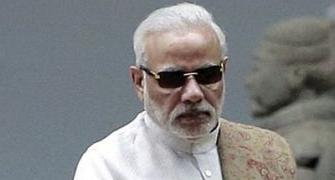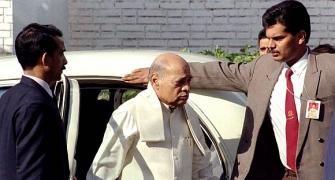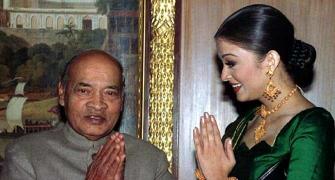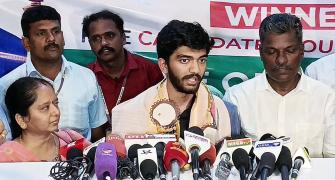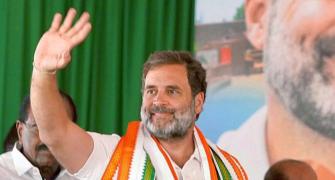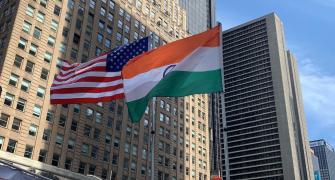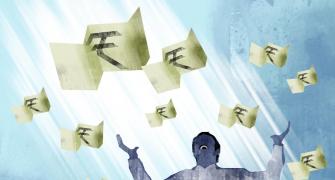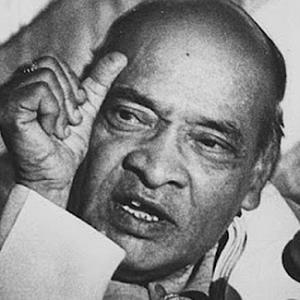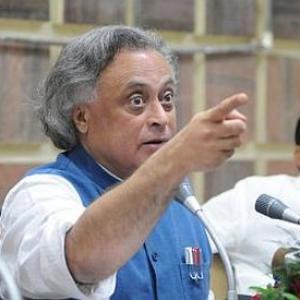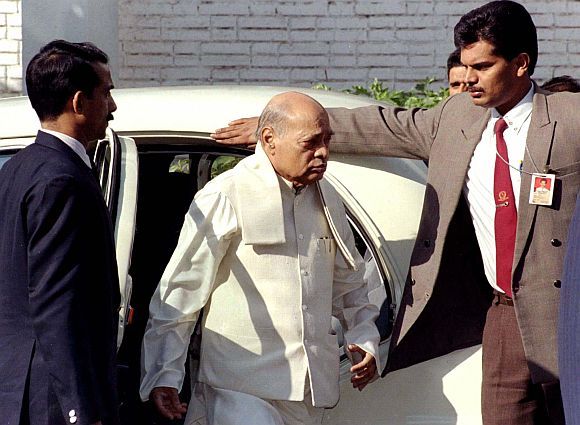
25 years ago today -- June 21, 1991 -- P V Narasimha Rao became prime minister of India, and changed the way this nation did its business with itself and the world.
Former Union minister Jairam Ramesh, who served in P V Narasimha Rao's office in those tumultuous months in 1991 when India changed forever, assesses the mysterious loner.
An extract from Jairam Ramesh's book, To The Brink And Back.
So, at the end of it all, what do I make of Narasimha Rao?
There is no need to revile him -- as indeed he has been -- or render him with a halo -- as is being done to fight today's political battles. What is important is an objective assessment, a frank appraisal, something that the Chinese do but we seem to be incapable of.
After all, Mao was officially declared 70 per cent right, 30 per cent wrong. And Mao himself had said that 'We consider that out of Stalin's ten fingers, only three were bad.'
There is no doubt that Rao was navigating India through a most troubled period, and that he had inherited a number of encumbrances. He was not in the best of health. He headed a minority government -- a government that won a vote of confidence because many parties had walked out.
Rao came to power against the backdrop of the brutal assassination of a young leader of immense charm and charisma, a man of great energy and exuberance -- all qualities that he himself lacked in abundance.
Even while the party he headed was in a state of shock, he had to stave off a leadership challenge from one of his colleagues, who he went on to accommodate in his cabinet as defence minister.
At the same time, Rao was buffeted by all sorts of problems. A senior oil industry executive had been abducted in the Kashmir Valley -- which was in ferment -- and was kept in captivity for fifty-five days. Punjab was in a state of tumult. The abrasive chief election commissioner was giving the government a hard time.
Rao's party's government in Karnataka, a traditional bastion, was tottering. Another ally ruling in Tamil Nadu had started giving him huge headaches by her theatrical actions on the Cauvery river waters issue.
The principal Opposition party had resumed its shrill campaign for building a Ram Mandir in Ayodhya.
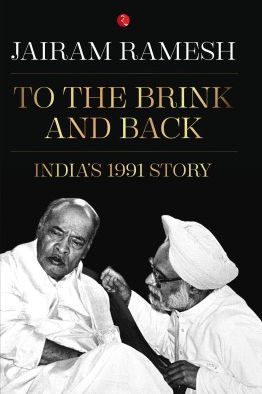 To make matters worse, Rao was under immense pressure to implement the hundred-day agenda mentioned in the party's manifesto, even while the economy was in the doldrums -- gold continued being hypothecated to the Bank of England; foreign exchange remained at dangerously low levels; and inflation was running at over 16 per cent.
To make matters worse, Rao was under immense pressure to implement the hundred-day agenda mentioned in the party's manifesto, even while the economy was in the doldrums -- gold continued being hypothecated to the Bank of England; foreign exchange remained at dangerously low levels; and inflation was running at over 16 per cent.
As though this weren't bad enough, Rao had appointed somebody from outside the world of mainstream politics as his finance minister.
Without doubt, Narasimha Rao confronted huge challenges. Yet, in the very brief period I saw him at the closest of quarters, I have to say that he was simply magnificent. A lifetime of circumspection gave way to courage.
From the outset, Rao proved everybody wrong. A man who famously remarked, 'Even not taking a decision is a decision,' was remarkably decisive in the initial months. Indeed, one of Narasimha Rao's closest aides, who worked with him when he was Union minister and prime minister, but who prefers to be anonymous, says: "I don't believe he (Rao) was indecisive; he was deferential to authority or to positions where the ultimate responsibility for decisions lay, but where he was assured that the position was his to hold, he was quick to decide. He crafted the National Policy on Education in May 1986 within eight months of taking charge of that (human resource development) ministry, and directed its modification, as prime minister, six years later.'
The aide went on to say, 'I think he (Rao) was confident that the public postures of pressure to which he appeared subject would never, at that point in time, translate into actions that would threaten his government or indeed -- and this was crucial and borne out in his private conversations with those who pressured -- thwart the essential pace of reform.'
Would anybody else in his place have done differently in the initial months? It's hard to tell, but undoubtedly, Rao brought some unique characteristics.
For one, by surprising everyone and ensuring that quick decisions were taken, by being exceedingly crafty as well as bold, he propelled change; critics could carp about the state of things, but they, too, knew in their heart of hearts that what he was doing was inevitable.
Rao did not have the image of being pro-business and pro-industry, but to be fair, that could be because he had never served in an economic ministry earlier. This further meant that if he was championing liberalisation, there may well have been something of value in it for the nation.
Moreover, Rao had been around in Parliament for over a decade and hence, his voice did command respect. His reputation was that of a scholar who had been given a lot of importance by Indira Gandhi and Rajiv Gandhi and hence, when he spoke, he was heard intently, even if, more often than not, what he said appeared metaphysical and complicated.
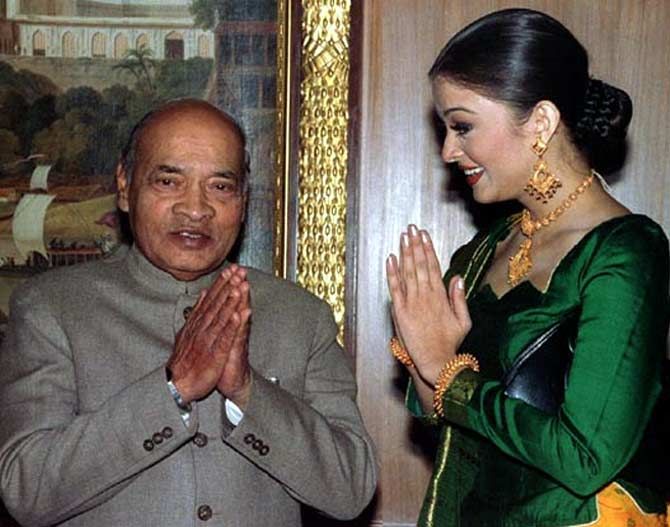
Undoubtedly, Narasimha Rao, self-effacing at one level, was a man acutely conscious of his own capabilities, without ever projecting a machismo of any kind. He could certainly not be accused of Narendra Modi's style of arrogance; rather, in him, one could see a strong sense of self-awareness. His was not the in-your-face conceit of his current successor but the self-pride of an intellectually superior person -- of one who knows that he knows.
Indeed, it wouldn't be an exaggeration to say that Narasimha Rao actually was a man of many parts. Unfortunately, many of his personal accomplishments have remained hidden. That he was a polyglot was quite well known -- fluent in Telugu, Marathi, Hindi, Sanskrit and Urdu; familiar with Arabic and Farsi; able to give interviews in Spanish; and capable of writing in French.
What is less well known is his computer savviness, which was next only to Rajiv Gandhi amongst politicians then. He was personally operating desktops in the late 1980s and was amongst the very first to start using laptops.
I recall, he once saw a Taiwanese laptop with me, assembled in India by Zenith, and asked me to get two sets for him -- he kept one and gave the other to Congress leader Jitendra Prasada.
What also isn't well known is that he was a tennis buff, with the Spaniard great, Manuel Santana, apparently being one of his favourites!
My abrupt exit from the PMO was not pleasant -- at least not from my point of view. For quite some time I seethed in rage, even while keenly aware of the helplessness of my position. Yet, I could not but admire the man who was responsible for my expulsion, and who, in some ways, was the Chinese revolutionary Deng Xiaoping's counterpart in India.
Both were old men. Both had their ups and downs (more downs than ups). But when the moment came, they seized the opportunity to leave their imprint -- Rao did it in June 1991, and Deng did it first in 1978 and then, more famously, in 1992. In the case of Deng, it was a complete U-turn -- moving away from Mao's hardline policies, and combining the Communist Party's socialist ideology with a practical adoption of economic reform.
In Rao's case, although he changed the paradigm of economic policy, the paradigm itself had been chopped away bit by bit for well over a decade, with the blueprint for change having been debated and discussed for a number of years. Notwithstanding his many talents, it must be admitted that Narasimha Rao was a most puzzling man.
Rao was a complex personality, not at all easy to comprehend, and he made no effort whatsoever to make people want to understand him -- except when he was on the backfoot.

I was simply in no position to know what went wrong between him and his own party -- a party he had served with distinction for almost half a century. I was an anguished witness to a most painful event on January 24, 1998 which showed how remarkably friendless Narasimha Rao had become within the Congress.
The occasion was the release of the Congress manifesto for the 1998 Lok Sabha elections. I was seated on the dias when, in response to a question, the Congress president, Sitaram Kesri, emphatically declared that his predecessor would not be put up as a candidate in the upcoming polls.
It was a most jarring moment, and coming from someone who had been personally selected by Rao as a successor made it even more unpleasant. The manifesto sank without a trace as the only news to hit the headlines was the former prime minister's humiliation.
Narasimha Rao was indisputably a loner, a man who didn't do much to cultivate and build relationships. To borrow a phrase from Michael White's biography of Isaac Newton, Narasimha Rao was above all 'a secretive man, a man coiled in upon himself.'
Moreover, his relationships with the sleaziest of characters -- (Godman) Chandraswami being the most notable of them -- which I saw at close quarters, were inexplicable and did no justice to a man of such erudition and learning.
At one stage in the early days of his prime ministership, Chandraswami had convinced Narasimha Rao that India could easily tide over its immediate financial crisis because the godman's buddy, the Sultan of Brunei, had agreed to extend a line of credit to India at the most concessional terms without any questions asked. That the prime minister took this suggestion seriously is borne out by the fact that a plane was ready to fly the finance minister to meet the Sultan!
Rao's problems truly started with the Harshad Mehta securities scam that first came to light in April 1992, and thereafter, with the demolition of the Babri Masjid on December 6, 1992, an event that many of his own party colleagues believe he helped orchestrate, or allowed to happen or, at the very least, knew of as it unfolded, without intervening decisively.
Almost the entire Congress believes that he wanted the masjid out of the way so that a permanent solution to the imbroglio at Ayodhya could be found.
I had called Rao around 4 pm that fateful Sunday before leaving for Mumbai with Pranab Mukherjee, only to be told that the prime minister 'andar hain (is inside).' Rao has offered an elaborate defence of himself in his book that came out two years after his death. That defence cannot be ignored.
There were many circumstances that did preclude him from imposing President's Rule in Uttar Pradesh in October or November 1992. But there is no doubt that the responsibility for ensuring that December 6, 1992 never happened was his and his alone, even if there may be different views on his culpability with regard to what transpired that day.
If Rao still remains compelling of our attention, even commendation, it is for the truly transformational leadership he demonstrated at a most precarious time in India's economic history. Of course, it could be argued that he had no choice and the alternative would have been to go down in history as the prime minister who presided over a default -- but that would be tantamount to cavilling.
Rao did not put a foot wrong forward in the initial months, and displayed both political maneuvering and statesmanship of the highest order.
Moments sometimes produce men (and women). Narasimha Rao is an outstanding example of this.
Narasimha Rao's masterstroke was the appointment of Manmohan Singh. One of his closest aides later recalled to me that even as a Cabinet minister, Rao always felt that a prime minister should always have one source of senior, substantive and non-political advice, especially in those areas where the prime minister is weak.
The aide also recalled Rao citing the precedent of D R Gadgil, who was deputy chairman of the Planning Commission between 1967 and 1971. In Manmohan Singh, Narasimha Rao found a tailor-made bulwark.
It is true that Rao had told his finance minister right at the very beginning, 'Manmohan, if things go wrong, your head is on the chopping block; if we succeed, the credit will be ours.'
Notwithstanding this warning, and despite the enormous pressure and criticism he faced, Rao backed his finance minister to the hilt, allowing him full freedom, even when his instincts told him not to.
I have always believed that the personality of the finance minister has much to do with the degree to which economic reforms seem palatable in the initial months and years.
Manmohan Singh made the years of liberalisation appear acceptable, largely because he defied ideological labels, and could, if anything, only be called moderately left-of-centre.
At critical moments, what is said and done might matter; but what truly counts is the person who is talking and how he presents his case. The finance minister may have lacked political standing, but he had unparalleled moral authority, apart from unsurpassed intellectual gravitas.
His phenomenal personal reputation for simplicity and his non-threatening style helped sell the bitter pills of devaluation, gold sales, subsidy cuts and whole-scale industrial deregulation.

Manmohan Singh's integrity has always been unimpeachable and what better example than what he did after he and Rao had taken a decision to devalue the Indian rupee?
Manmohan Singh was worried that his personal rupee balance, born out of modest dollar savings from his South Commission stint in Geneva during 1987-90, would swell with the proposed changes in the rupee-dollar exchange rate. Therefore, he informed the prime minister that the 'windfall' gains would be deposited in the Prime Minister's Relief Fund.
My own feeling is that what got accomplished in June-July 1991 was inevitable, if our goal was to avoid the opprobrium of default. The Rao-Singh duo happened to be at the right place at the right time. They had neither bargained nor lobbied for the responsibilities they found themselves with; but there they were, saddled with onerous tasks.
Carpe diem, wrote Horace in his immortal Odes. This is exactly what the Rao-Singh jugalbandi did -- they seized the day. There was no guarantee of success, and certainly no likelihood of quick positive outcomes; indeed, the results of the reforms started becoming evident only after 1993.
Consequently, theirs was a huge leap of faith. It was, in fact, a gamble of sorts. The most risk-averse of gentlemen took this wager only because the alternative -- namely a default -- was an anathema to both. Besides, they were men intent on carving a distinctive niche for themselves in India's political and economic history.
And let there be no mistake about it -- they definitely did. To borrow an analogy from Isaiah Berlin, if Manmohan Singh was the hedgehog who knew only one big thing and that is economic reforms, Rao was the fox who knew many things. It is this fox-hedgehog combine that rescued India in perhaps its darkest moment.
India in 1991 could well have mirrored Greece in 2015. That it didn't is due to the Narasimha Rao and Manmohan Singh combine. June-July 1991 was a revolution, but it was an evolutionary one -- some years in the making.
There was, no doubt, a huge element of chance in what Rao-Singh did, but as Louis Pasteur said, 'Chance favours only the prepared mind.' Narasimha Rao's political astuteness and Manmohan Singh's economic wisdom brought India back from the very brink.
Together, they demonstrated that a consensus can, on occasion, be created by tough executive action. They proved that sometimes, if you listen intently but do what you have set out to do unwaveringly, accord can emerge. They converted an unprecedented crisis into a not-to-be-lost opportunity.
Of course, circumstances were ripe for a mindset change, but more than being lucky by being there at the right time, they were plucky -- they challenged set minds.
The hand of destiny took me close to Rao and Singh as they began saving the country. And although I remained in their vicinity for an exceedingly short while, I was privileged to play a small role -- in the words of one of Rao's closest aides -- in setting history in motion.
Excerpted from To The Brink And Back, by Jairam Ramesh, Rupa, 2015, with the publisher's kind permission.

